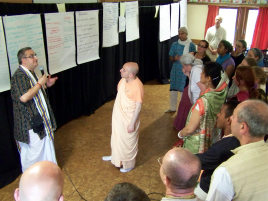European Team Grapples with ISKCON’s Reputation
By Kancana-vali Dasi | Июл 08, 2011

30 ISKCON members, communications representatives, and leaders met for four days in the historic Radhadesh temple to ask why, after more than 40 years in Europe, ISKCON is still loved in some parts of the continent, and evokes suspicion and misunderstanding in others.
Anuttama Dasa, ISKCON International Communications director, opened the session by challenging the group, asking if leaders and members of ISKCON take communications seriously enough, or only allocate resources to it at times of crisis?
“ISKCON has made tremendous gains in the last few decades” said Anuttama Dasa, “but for ISKCON to continue to grow, and to have a positive impact in Europe and around the world, we need to proactively interface with the world around us, including those who mold public opinion. That’s what communications is all about, and we simply have not dedicated enough resources to this pressing need.”

Shaunaka Rishi Dasa, former director of ISKCON Communications Europe, and current Director of the Oxford Center for Hindu Studies reviewed the history of IC campaigns for religious freedom from 1975 to 2000, and beyond. He analyzed that when ISKCON devotees were proactive in building relationships with the media, academics and governments – even when those were initially unfavorable – ISKCON devotees were able to forge working relationships and to protect religious liberties for Vaishnavas, and others.
Shaunaka Rishi pointed out, “Good communication isn’t about putting across a perfect, polished, but inaccurate image. Good communication means to act with humility, honesty, and sincerity.”
Participants were also challenged by a report by academic Professor Eileen Barker, former director of INFORM and professor of sociology at the London School of Economics assessing the various types of “cult-watching” groups in Europe. Such organizations have, in the past, branded ISKCON in a dark light. At the same time, Professor Barker pointed out, that by engaging in dialogue with some groups, ISKCON has learned to face its critics and corrects its collective mistakes.

Following Professor Barker’s presentation, a panel looked at ISKCON’s response to “anti-sect” groups in Spain, the Czech Republic, Ireland, and the US. Those reports confirmed that where ISKCON faced its critics openly, and built relationships to help others understand the society’s positive contributions, positive opinions were the result.
It was pointed out that since it has been possible to clear up many past misunderstandings and challenges through good reflective communications, it is very important for ISKCON to have people available for this valuable service.

As in the past, one of the main challenges to achieve this is lack of funding and manpower. Many devotees involved in communications are volunteers. In such an important sphere – where members of the Society interact with politicians, academics, and those in the media on behalf of ISKCON – is ISKCON’s leadership ready and able to invest scarce resources?
The continuing importance of communications can be seen now in Hungary where there are substantial changes being proposed by the Government in how it accommodates fledgling religious movements. Proposed changes to Hungary’s Constitution would mean, amongst other things, that ISKCON would receive substantially less financial support than it has in the past, and the Society’s ability to maintain its good work would be hampered.

Rasamandala Dasa, co-director of ISKCON Educational Services in the UK, led an interesting workshop on the pressing need for good communications between various Vaishnava and Gaudiya-Vaishnava groups, and amongst Hindu groups in general.
In the early days of ISKCON there were few, if any, organizations promoting the spiritual practices of Gaudiya-Vaishnavism outside of India. However, at the beginning of the 21st century, ISKCON no longer commands an exclusive presence in the field.
What remains to be seen is whether the Society can adapt to the new dynamics, or be relegated to a mere spectator whilst others define the parameters of the kirtan movement?
Pranava Dasa is a leading scholar who has studied the Gaudiya Matha under the dynamic leadership of the Gaudiya acarya, Bhaktisiddhanta Sarasvati Thakura. During his presentation Pranava explained that “part of Bhaktisiddhanta’s brilliance was his ability to get very different devotees, and even different traditions, to work cooperatively together.”















